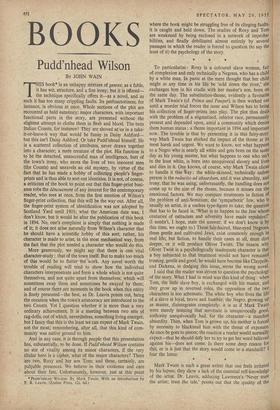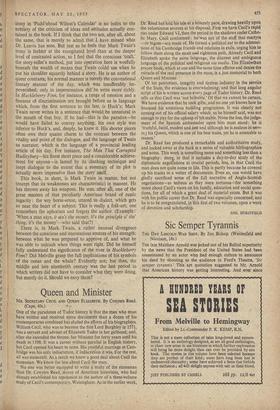BOOKS
Pudd'nhead Wilson
. BY JOHN WAIN THIS book* is an unhappy mixture of genres; as a fable, it has wit, structure, and a fine irony; but it is offered— the technique specifically offers it—as a novel, and as such it has too many crippling faults. Its perfunctoriness, for instance, is obvious at once. Whole sections of the plot are recounted as bald summary; major characters, with important functional parts in the story, are presented without the slightest attempt to clothe them in flesh and blood. The twin Italian Counts, for instance! They are shoved at' us in a take- it-or-leave-it way that would be funny in Daisy Ashford— but this isn't Daisy Ashford. Or take Pudd'nhead himself. He is a scattered collection of attributes, never drawn together into a character; a mere creature of the plot. His function is to be the detached, unsuccessful man of intelligence, butt of the town's irony, who saves the lives of two innocent men (the Counts) and unravels an old mystery, by virtue of the fact that he has made a hobby of collecting people's finger- prints and is thus able to sort out identities. It is not, of course, a criticism of the book to point out that this finger-print busi- ness robs the denouement of any interest for the contemporary reader, who sees at once, from the first mention of Wilson's finger-print collection, that this will be the way-out. After all, the finger-print system of identification was not adopted by Scotland Yard until 1901; what the American date was, I don't know, but it would be after the publication of this book in 1894. No, one's complaint is simply that nothing is made of it; it does not arise naturally from Wilson's character that he should have a scientific hobby of this sort; rather, his character is made to arise, in the most mechanical way, from the fact that the plot needed a character who would do this.
More generously, we might say that there is one vital character-study : that of the town itself. But to make too much of this would be to flatter the work. Any novel worth the trouble of reading will tend to show how the individual characters interpenetrate and form a whole which is not quite themselves, and not quite apart from themselves; which will sometimes sway them and sometimes be swayed by them; and of course there are moments in the book when this entity is finely presented—the best, as Dr. Leavis points out, being the occasion when the town's aristocracy are introduced to the two Counts. Yet I question whether it is more than a very ordinary achievement. It is a meeting between two sets of rag-dolls, out of which, nevertheless, something living emerges; but I fancy that this is the least we can expect of Mark Twain. not the most; remembering, after all, that this kind of com- munity was native ground to him.
And in any case, it is through people that this presentation has, substantially, to be done. If Pudd'nhead Wilson contains no stir of vitality among its minor characters, if the very titular hero is a cipher, what of the major characters? There are two, Roxy and her son Tom; and these, certainly, are palpable presences. We believe in their existence and care about their fate. Unfortunately, however, just at this point * PUDIVNHCAD WILSON. By Mark Twain. With an introduction by F. R. Leavis. (Zodiac Press, 12s. 6d.) where the book might be struggling free of its clinging faults, it is caught and held down. The studies of Roxy and Tom are weakened by being enclosed in a network of improba- bilities, and finally debilitated almost entirely by several passages in which the reader is forced to question (to say the least of it) the psychology of the story.
* * *
To particularise : Roxy is a coloured slave woman, fair of complexion and only technically a Negress. who has a child by a white man. In panic at the mere thought that her child might at any time in his life be 'sold down the river,' she exchanges him in his cradle with her master's son. born on the same day. The substitution-theme, evidently a favourite of Mark Twain's (cf. Prince and Pauper), is then worked out until a murder trial forces the issue and Wilson has to bring his collection of finger-prints into play. The plot thus deals with the problem of a stigmatised, inferior race, permanently present and depended upon, amid a community which denies them human status : a theme important in 1894 and 'important now. The trouble is that by presenting it in this fairy-story way Mark Twain has shirked the impact of the theme at its most harsh and urgent. We want to know, not what happens to a Negro who is nearly all white and gets born on the same day as his young master, but what happens to one who isn't in the least white, is born into unequivocal slavery and lives and dies in it. One knows, of course, why Mark Twain chose to handle it this /hy : the white-skinned, technically unfree person is the reductio ad absurdum, and it was absurdity, and irony, that he was using; unfortunately, the handling does not come up to the size of the theme, because it misses out the emotional factors. We may compare treatments in fiction of the problem of anti-Semitism; the 'sympathetic' Jew, who Is usually an artist, is a useless type-figure to take; the question that has to be faced is, 'What is to happen to the Jew whom centuries of ostracism and adversity have made repulsive?' (I needn't, I hope, state the answer; if we don't know it by this time, we ought to.) These fair-haired, blue-eyed Negroes, these gentle and cultivated Jews, exist commonly enough in real life; but fiction, to handle their cases at all, must dive deeper, or it will produce Oliver Twists. The reason why Oliver Twist is a psychologically inadequate character is that a boy subjected to that treatment would not have remained. trusting, gentle and good; he would have become like Claypole, and Dickens, in dodging this issue, wrote the wrong novel.
I said that the reader was driven to question the psychology of the story. What 1 had in mind was this kind of thing : when Tom, the little slave boy, is exchanged with his master, and they grow up in reversed roles, the opposition of the two characters is too schematic. The white boy who lives the life of a slave is loyal, brave and humble; the Negro. growing up as master, disintegrates completely; it is as if Mark Twain were merely insisting that servitude is unequivocally good, authority unequivocally bad, for the character—a manifest absurdity. Then, when Tom is grown up, his mother is forced by necessity to blackmail him with the threat of exposure. At once he goes to pieces; the reaction a reader would normally expect—that he should defy her to try to get her word believed against his—does not come. Is there some deep reason for this, or is it just that the story would come to a standstill? 1 fear the latter.
* * Mark Twain is such a great writer that one feels irritated by his lapses; they show a lack of the essential self-knowledge of the artist. Dr. Leavis, adducing Lawrence's 'Never trust the artist; trust the tale,' points out that the quality of the irony in 'Pudd'nhead Wilson's Calendar' is no index to the subtlety of the criticism of ideas and attitudes actually con- tained in the book. if I think that the two are, after all, about the same, that is merely to admit that I have missed what Dr. Leavis has seen. But just as he feels that Mark Twain's irony is feebler at the excogitated level than at the deeper level of contrasted action, so I feel that the conscious 'craft,' the story-teller's method, put into operation here is woefully beneath the wealth of means that Twain could use when he put his shoulder squarely behind a story. He is an author of queer contrasts; his normal manner is merely the conventional literary manner of the day, which was insufferably im- poverished; only in impersonation did. he write more richly. In Huckleberry Finn. for instance, a range of emotion and a fineness of discrimination are brought before us in language which, from the first sentence to the last, is Huck's; Mark Twain never writes in a sentence that would be unnatural in the mouth of that boy. if he had—this is the paradox—he would have failed to convey anything; his own style was inferior to Huck's, and, deeply, he knew it His shorter pieces often owe their quaint charm to the contrast between the vitality and point of the dialogue, and the language of Twain as narrator, which is the language of a provincial leading article of his day. For instance, The Man That Corrupted Hadleyburg—his finest short piece and a considerable achieve- ment for anyone—is lamed by its clanking technique and inept dialogue to the extent that a summary of its plot is actually more impressive than the story itself.
This book, in short, is Mark Twain in matter, but not (except that its weaknesses are characteristic) in manner. He has thrown away his weapons. He was, after all, one of the great masters of that peculiarly American brand of rustic sagacity : the wry horse-sense, uttered in dialect, which gets so near the heart of a subject. This is really a folk-art; one remembers the aphorism and forgets the author. (Example : 'When a man says, it ain't the money, it's the principle o' the' thing, it's the money'—who said that?) There is, in Mark Twain, a rather unusual divergence between the conscious and unconscious sources of his strength; between what he was prepared to approve of, and what he was able to unleash when things were right. Did he himself fully understand the significance of the river in Huckleberry Finn? Did Melville grasp the full implications of his symbols of the ocean and the whale? Evidently not; but then, the middle and late nineteenth century was the last period in which writers did not have to consider what they were doing. but merely do it. Should we envy them?











































 Previous page
Previous page